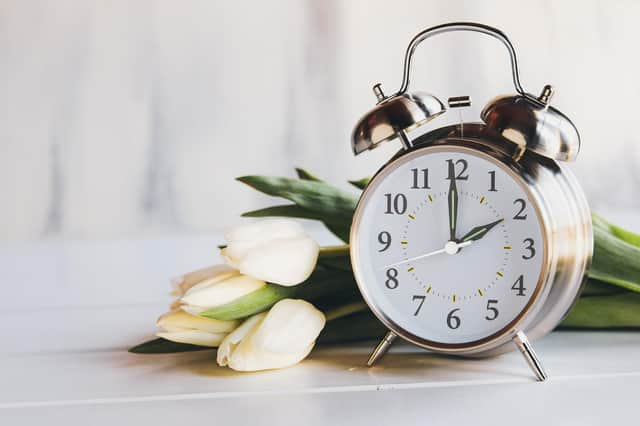Alzheimer's Society shares clock change advice


Despite this routine occurring twice every year, many people are caught out by the extra hour lost or gained. But for people with dementia, the time change may cause more than just a surprise.
The UK’s leading dementia charity, Alzheimer’s Society, has advised that of the 22,000 people living with dementia in Northern Ireland, many may find themselves disorientated by the clocks moving forward.
Advertisement
Hide AdAdvertisement
Hide AdAs daylight begins to start earlier and end later, people with dementia may find it difficult to differentiate between 6am and 6pm. This can disrupt their circadian biological clock and make it hard for them and those who care for them to get enough sleep.
Not feeling ready to sleep because it is light outside can cause the person to become overtired, which can cause low mood and affect their ability to think clearly. They may also become irritable and distressed. These changes can also impact those who love and care for a person with dementia.
Angelo Makri, senior knowledge officer for Wellbeing at Alzheimer’s Society, said: “For the majority of people, the clocks changing doesn’t have much of an impact at all - although having to work out how to reset the clock on the oven and in the car is nobody’s idea of fun. While it is often only a minor nuisance for the majority of people, for people living with dementia it can disrupt their body clock and cause confusion and anxiety.”
Here are four top tips from Alzheimer’s Society to help people with dementia overcome challenges faced by the clocks going forward:
Advertisement
Hide AdAdvertisement
Hide AdThink about having your evening meal and going to bed an hour earlier on Saturday, so that the person can still get their usual amount of sleep and wake up at their usual time on Sunday. In this way, the person’s routine will only be different for an evening rather than a full day.
Use a visual aid to help the person with dementia identify the start and end of the day. Alzheimer’s Society’s online shop sells ‘Day and Night’ clocks which include simple visual symbols to help people with dementia distinguish the time of day.
Going outside and getting some gentle exercise can help the person feel sleepier during the evening so they go to bed at their usual time. If the person is unable to go outside, helping them keep active during the day can have a similar effect. Think about using blackout curtains to reduce sunlight in the evenings too.
Having a routine during the day and at bedtime can help regulate a person’s disrupted body clock. Doing regular activities at the same time each day – for example going for a walk after breakfast, can help a person with dementia make sense of the time. Alzheimer’s Society’s online shop sells devices that can help with managing daily routines, and reminders to complete daily tasks at regular times.
Fore more information, visit alzheimers.org.uk or phone the Dementia Support Line on 0333 150 3456.
Comment Guidelines
National World encourages reader discussion on our stories. User feedback, insights and back-and-forth exchanges add a rich layer of context to reporting. Please review our Community Guidelines before commenting.